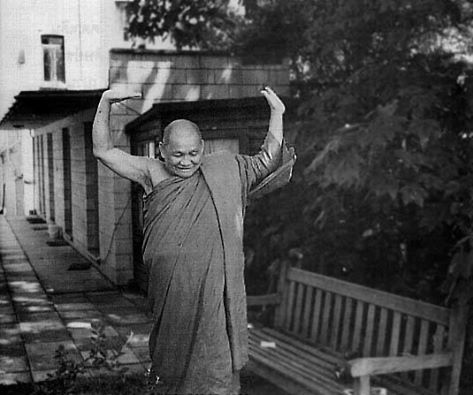
ศีลนั้นคือระเบียบควบคุมรักษากายวาจาให้เรียบร้อย ว่าโดยประเภทมีทั้งของชาวบ้านและของนักบวช
แต่เมื่อกล่าวโดยรวบยอดแล้ว มีอย่างเดียว คือ เจตนา ในเมื่อเรามีสติระลึกได้อยู่เสมอ
เพื่อควบคุมใจให้รู้จักละอายต่อการทำชั่วเสียหาย และรู้สึกตัวกลัวผลของความชั่วจะตามมา
พยายามรักษาใจให้อยู่ในแนวทางแห่งการปฏิบัติถูกต้อง ที่ควรเป็นศีลอย่างดีอยู่แล้ว
ตามธรรมดาเมื่อเราใช้เสื้อผ้าที่สกปรก และตัวเองก็สกปรกย่อมทำให้จิตใจอึดอัดไม่สบาย
แต่ถ้าหากเรารู้จักรักษาความสะอาดทั้งร่างกาย และเสื้อผ้าเครื่องนุ่งห่ม ย่อมทำให้จิตใจผ่องใสเบิกบาน
ดังนั้น เมื่อศีลไม่บริสุทธิ์ และกายวาจาสกปรก ก็เป็นผลให้จิตใจเศร้าหมองขัดต่อการปฏิบัติธรรม
และเป็นเครื่องกั้นใจมิให้บรรลุถึงจุดหมาย ทั้งนี้ขึ้นอยู่กับจิตใจที่ได้รับการฝึกมาดีหรือไม่เท่านั้น
เพราะใจเป็นผู้สั่งให้พูดให้ทำ ฉะนั้นเราจึงต้องมีการฝึกจิตใจต่อไป
- หลวงปู่ชา สุภัทโท -
"โอวาทบางตอน"
~ ~ ~ ~ ~ ~ ~ ~ ~
Morality is restraint and discipline of body and speech.
On the formal level this is divided into classes of precepts for lay people and for monks and nuns.
However, to speak in general terms, there is one basic characteristic - that is intention.
When we are mindful or self-recollected, we have right intention. Practicing mindfulness (sati) and self-recollection (sampajañña) will generate good morality.
It is only natural that when we put on dirty clothes and our bodies are dirty, that out minds too will feel uncomfortable and depressed. However, if we keep our bodies clean and wear clean, neat clothes,
it makes our minds light and cheerful. So too, when morality is not kept, our bodily actions and speech are dirty, and this is a cause for making the mind unhappy, distressed and heavy. We are separated from right practice and this prevents us from penetrating in the essence of the Dhamma in our minds. The wholesome bodily actions and speech themselves depend on mind, properly trained, since mind orders body and speech.
Therefore, we must continue practice by training our minds.
- Ajahn Chah -
"Fragments of a Teaching"
 รวมรูปภาพต่างๆเกี่ยวกับพระพุทธศาสนา พาเที่ยววัด ใน Kammatan.com Gallery
รวมรูปภาพต่างๆเกี่ยวกับพระพุทธศาสนา พาเที่ยววัด ใน Kammatan.com Gallery Dhamma in English : How to learning mind and how to do meditation , understand in suffering By ajan monk in Thailand.
Dhamma in English : How to learning mind and how to do meditation , understand in suffering By ajan monk in Thailand. หลวงปู่ชา สุภัทโธ Ajahn Chah - Conditions of the Mind (in Thai & English)
หลวงปู่ชา สุภัทโธ Ajahn Chah - Conditions of the Mind (in Thai & English) รวมรูปภาพต่างๆเกี่ยวกับพระพุทธศาสนา พาเที่ยววัด ใน Kammatan.com Gallery
รวมรูปภาพต่างๆเกี่ยวกับพระพุทธศาสนา พาเที่ยววัด ใน Kammatan.com Gallery Dhamma in English : How to learning mind and how to do meditation , understand in suffering By ajan monk in Thailand.
Dhamma in English : How to learning mind and how to do meditation , understand in suffering By ajan monk in Thailand. หลวงปู่ชา สุภัทโธ Ajahn Chah - Conditions of the Mind (in Thai & English)
หลวงปู่ชา สุภัทโธ Ajahn Chah - Conditions of the Mind (in Thai & English)